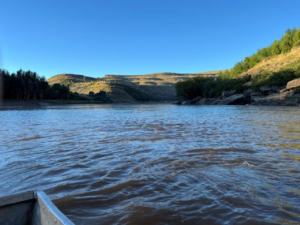Leading consulting engineering and infrastructure advisory firm Zutari was appointed to conduct the economic feasibility, environmental and social impact assessments, and design of the Tebellong bridge across the Senqu River in Thabana-Ts’oana (White-Hill) in Qacha’s Nek. This bridge would create access to the Tebellong Hospital for neighbouring communities and allow seamless transfers of patients and vital medical equipment between hospitals, explains Marco Steenkamp, Senior Transport Economist.
Tebellong Hospital is a mountainside facility built in 1965. At present most patients, workers, and visitors need to cross the Senqu or Orange River, which can take place by boat or 4×4 only, depending on the river current. Following the team’s initial economic feasibility and socio-economic impact assessment, results indicated that the proposed improvements were not economically feasible despite the evident positive wider socioeconomic impact. In response, the project team reconsidered the proposed improvements by analysing additional bridge options in conjunction with a more detailed traffic and economic analysis and ultimately presented economically feasible results.With a technically and economically feasible project, the client is now able to access finance for constructing the Tebellong Bridge, creating much needed (and in some instances lifesaving) access to the hospital, numerous schools in the area, and general economic activity.
“Development finance institutions and the NGOs they fund are increasingly requiring economic feasibility studies to accompany technical feasibilities,” explains Steenkamp. This is as socioeconomic and environmental impact become more significant metrics for development than infrastructure provision alone.Whether it is roads impacted by climate-related events, transportation of commodities, or pipelines moving gas, economic feasibilities support appropriate economic development through prioritising projects and present a strong case for accessing finance. “By becoming involved in the various stages of the project lifecycle, and more so in the early stages, the Zutari economics team enables impact derived from the infrastructure of today and tomorrow,” concludes Steenkamp.






